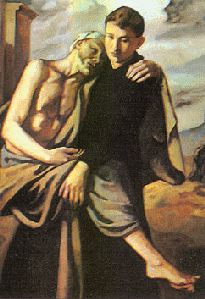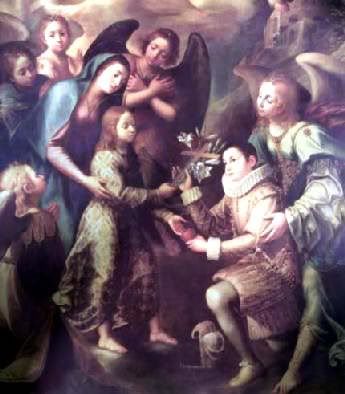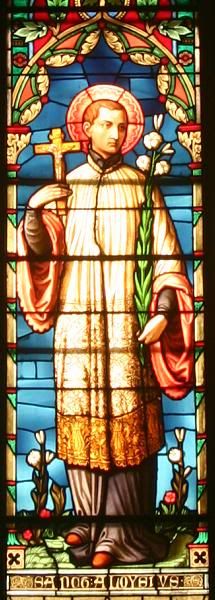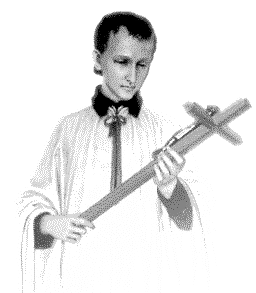Aloysius was born into a powerful and wealthy Italian family, in Lombary. His father, the Marquis of Castiglione, looked to his elder son to carry on the family legacy of political power and military excellence. As a child, Aloysius was dressed in a tiny suit of armor—hand-crafted at the request of the Marquis—and taken to review the troops under his father’s command.
Whereas his father was committed to Aloysius’ attainment of earthly status and power, his mother was quietly devout and pious, committing him to the Blessed Virgin during a difficult childbirth. Aloysius’ mother was meticulous in teaching Aloysius bis prayers and bis Faith. From Aloysius' infancy to his adulthood she always referred to him as her "little angel." He fit the title perfectly, for even as a baby he was seldom known to fuss and cry or show any signs of ill temper. All who met or cared for him remarked on his sweet disposition. The first words he spoke was that of the Holy Name of Jesus, and from a young age, he developed a deep devotion to Our Blessed Mother, eventually penning a praying of self-commendation to her care:
O Holy Mary, my Lady, into your blessed trust and safe keeping and into the depths of your mercy, I commend my soul and body this day, every day of my life, and at the hour of my death. To you I entrust all my hopes and consolations, all my trials and miseries, my life and the end of my life. By your most holy intercession and by your merits, may all my actions be directed and disposed according to your will and the Will of your divine Son. Amen.
By age seven, Aloysius had realized that politics and military exploits were not his calling, but in deference to his father, permitted himself to be sent to the court of the Grand Duke Francesco de Medici of Tuscany, where the two were to gain the polish and training needed to succeed in court. However, rather than engaging in the activities of the court, Aloysius secluded himself in his room, spending greater and greater amounts of time in prayer and reflection. At age ten, he committed himself completely to the Lord, vowing to remain a virgin, and to avoid all earthly sins.
As Aloysius' holiness grew, he became a source of terror for evil. On one occasion, a Franciscan who was known for his miracles and ability to cast out demons was visiting a church in a village not far from where Aloysius was sataying. The people flocked to see him, among them Aloysius and his brother, begging for prayers and miracles. While in the church, one of the possessed persons, on seeing Aloysius, pointed toward him and, in a fit of torturous rage, exclaimed in a demonic voice, "Do you see him? He will be in Heaven one day and great in glory!" Those around him began to recognize the faith and piety growing within him, unlike that of a boy his age.
Relocated again by his father, due to his failure to learn the ways of the court, Aloysius spent the next two years of his life in Mantua, where he lived with relatives. To Aloysius’ delight, the house in which he stayed contained a fine private chapel, where he spent time reading the lives of the saints and meditating on the Psalms. So great was his sorrow during bis prayers that the spot where he would kneel was soaked with the torrent of tears that flowed from his eyes. Here, at the young age of twelve, he felt first called to the priesthood. He further began a rigorous life of self-denial and mortification, fasting and depriving himself of all worldly things he desired. While remaining exceptionally polite, he never again looked a woman in the face, due to fear that he may be tempted to renounce his pledge of perpetual sinlessness. He further began to subject his body to torment, engaging in self-flagellation in reparation for his sins.
His father, greatly displeased with his son’s progress, brought him home where he continued his pious studies. It was there that he made his First Holy Communion, further deepening his intimate relationship with the Lord through the Blessed Sacrament. He received Holy Communion as often as he could, and spent hours each day praying the Holy Rosary. His virtues grew, and he became known by others as a humble, kind, and faith-filled young man. He forewent the fine attire of a noble, instead dressing in simple clothes. He dismissed his servants, preferring to do his own chores in humility.
In 1581, still intent on passing on his title of Aloysius, the marquis decided that the family would travel with Maria of Austria, of the Spanish royal house, on her return to Spain. Aloysius became a page attending the Spanish heir apparent and was also made a Knight of the Order of Saint James while living in Madrid. He also found a Jesuit confessor, and resolved to become a Jesuit. Prior to acceptance, however, he needed his father’s permission, which didn’t come easily. After threatening to have him flogged, the marquis and his young son engaged in a 3 year long battle of wills, which eventually Aloysius won.
Aloysius, full of love for his father, and full of the Grace of God, said to him, "I am in your power, father, and you can do with me what you please. But know this, that God calls me to the Society of Jesus, and you're resisting His Will by opposing my vocation." His father’s only reaction was to turn to the wall and burst into tears. After a few days of his sorrow he called for his son saying, "My son, what a cruel wound you have inflicted on my heart! I have always loved and still love you, because you deserve my love and I had set all my hopes on you. And now you tell me that God calls you elsewhere, I will not keep you back any longer; go where you will, and may God grant you happiness!"
Following receipt of his father’s permission to become a Jesuit at age 17, Aloysius renounced his considerable inheritance and left for Rome. He carried a letter from his father to the Jesuit superior general, which read, “I merely say that I am giving into your Reverence’s hands the most precious thing I possess in all the world.”
Aloysius, who had been practicing strict religious observances since youth, found the Jesuit noviaiate disarmingly easy, and much less rigorous than those restrictions he had undertaken at home. His superiors encouraged him to eat more regularly, pray less, relax more, and reduce his penances. Obediently, Aloysius accepted these curbs. In 1587, at that age of 19, Aloysius pronounced vows of poverty, chastity, and obedience, and the next year he received minor orders and began theology studies. He was certain of his need for continous penance, asserting that without mortification, he would revert to a sinful state. Aloysius is remembered for saying, “I am a crooked piece of iron, and have come into religion to be made straight by the hammer of mortification and penance.”
Following his studies, Aloysius found himself in the midst of the plague which struck Rome in 1591. Committed to serving those in need, Aloysius carried the dying from the streets of Rome to the Jesuit hospital, washing and feeding them, and preparing them to receive the sacraments. He sat with the ill, reading to them, guiding their devotions, and bringing them to the heart of Christ. While he worked tirelessly and without a sign of complaint, he privately confessed to his confessor that he fought every moment not to express his repulsion at the sights and sounds of the grueling work. Nevertheless, he carried on diligently, offering kindness, dignity, and love to those that society had forgotten about.
As more and more succumbed to the disease—including many young Jesuits—Aloysius was forbidden to continue his work with the ill. Accustomed to his requests being refused, Aloysius asked permission to return to the hospital, and was eventually allowed to again care for the sick. The hospital he was reassigned to did not allow patients with contagious diseases, and therefore his superiors considered their eager charge quite safe. While there, came a man so diseased that no one would go near him. Aloysius immediately thought to himself: “here is Jesus.” Aloysius lifted the man out of his sick bed, tended to him, and brought him back to his bed. The man, despite the prohibition at the hospital, was infected with the plague, and Aloysius became quickly ill and bedridden himself.
Like most, Aloysius quickly succumbed to the disease. In the weeks of his infirmity, he still rose every night to pray before a crucifix, until forbidden by his superiors. His body became so covered with sores that he was in constant pain, but never once complained, only likening his pain to that of Jesus. On June 21, as he sensed his death was imminent, his Jesuit brothers brought him Communion. He cried out, “I am going, gladly,” and with his eyes fixed on a crucifix, Aloysius proclaimed, “Father, into your hands I command my spirit.” He then struggled to pronounce the name of Jesus repeatedly until he died at the young age of 23.
Saint Aloysius was buried in the Church of the Annunciation, belonging to the Jesuits of the Roman college. Soon after his death, a well-adorned chapel was built in that church under his name, by the Marquis Scipio Lancelotti, and his relics were translated into it. Since that time, numerous miracles have been reported through his intercession.
Prior to his death, Saint Aloysius sent his mother a letter, detailing his devotion and faith. His words convey the purity, obedience, humility, and love of this holy man, who through selfless service, helped so many:
"May the comfort and grace of the Holy Spirit be yours for ever, most honored lady. Your letter found me lingering still in this region of the dead, but now I must rouse myself to make my way on to heaven at last and to praise God for ever in the land of the living; indeed I had hoped that before this time my journey there would have been over. If charity, as Saint Paul says, means to weep with those who weep and rejoice with those who are glad, then, dearest mother, you shall rejoice exceedingly that God in his grace and his love for you is showing me the path to true happiness, and assuring me that I shall never lose him.
The divine goodness, most honored lady, is a fathomless and shoreless ocean, and I confess that when I plunge my mind into thought of this it is carried away by the immensity and feels quite lost and bewildered there. In return for my short and feeble labours, God is calling me to eternal rest; his voice from heaven invites me to the infinite bliss I have sought so languidly, and promises me this reward for the tears I have so seldom shed.
 Take care above all things, most honoured lady, not to insult God’s boundless loving kindness; you would certainly do this if you mourned as dead one living face to face with God, one whose prayers can bring you in your troubles more powerful aid than they ever could on earth. And our parting will not be for long; we shall see each other again in heaven; we shall be united with our Saviour; there we shall praise him with heart and soul, sing of his mercies for ever, and enjoy eternal happiness. When he takes away what he once lent us, his purpose is to store our treasure elsewhere more safely and bestow on us those very blessings that we ourselves would most choose to have.
Take care above all things, most honoured lady, not to insult God’s boundless loving kindness; you would certainly do this if you mourned as dead one living face to face with God, one whose prayers can bring you in your troubles more powerful aid than they ever could on earth. And our parting will not be for long; we shall see each other again in heaven; we shall be united with our Saviour; there we shall praise him with heart and soul, sing of his mercies for ever, and enjoy eternal happiness. When he takes away what he once lent us, his purpose is to store our treasure elsewhere more safely and bestow on us those very blessings that we ourselves would most choose to have. I write all this with the one desire that you and all my family may consider my departure a joy and favor and that you especially may speed with a mother’s blessing my passage across the waters till I reach the shore to which all hopes belong. I write the more willingly because I have no clearer way of expressing the love and respect I owe you as your son."
I write all this with the one desire that you and all my family may consider my departure a joy and favor and that you especially may speed with a mother’s blessing my passage across the waters till I reach the shore to which all hopes belong. I write the more willingly because I have no clearer way of expressing the love and respect I owe you as your son."Saint Aloysius found Christ everywhere, especially in the ill, the helpless, the forgotten, and the dying. Despite his physical repulsion, he ministered to those in need, offering them love and dignity in their last moments. Pure throughout his life, Saint Aloysius offers us a model of selflessness and charitable love—virtues we are all called to live out each day in our own communities. How easy it would have been for Aloysius to turn from God, embrace his noble privileged life, and life with wealth and power. Instead, he forsake all he had, turning to face the Lord, bathed in His grace, and became an instrument of good in the world. How often can we say the same for ourselves?
giver of all good things,
in Saint Aloysius you combined remarkable innocence with the spirit of penance.
By the help of his prayers may we who have not followed his innocence follow his example of penance.
Grant this through our Lord Jesus Christ, Your Son,who lives and reigns with You and the Holy Spirit, one God, for ever and ever. Amen.



















No comments:
Post a Comment
Thanks for leaving a comment. If you wish to submit a prayer request, however, please do so above, using the "Contact" tab.